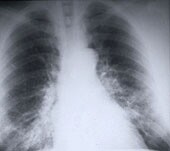- Could Artificial Sweeteners Be Aging the Brain Faster?
- Techniques for Soothing Your Nervous System
- Does the Water in Your House Smell Funny? Here’s Why
- Can a Daily Dose of Apple Cider Vinegar Actually Aid Weight Loss?
- 6 Health Beverages That Can Actually Spike Your Blood Sugar
- Treatment Options for Social Anxiety Disorder
- Understanding the Connection Between Anxiety and Depression
- How Daily Prunes Can Influence Cholesterol and Inflammation
- When to Take B12 for Better Absorption and Energy
- Epsom Salts: Health Benefits and Uses
Can Statins Help Lower Lung Cancer Death Risk?


Taking the cholesterol-lowering medications known as statins for a year before getting a diagnosis of lung cancer was associated with a 12 percent lower risk of dying from that cancer, new research suggests.
The researchers from Northern Ireland also found indications that those who had a minimum of 12 statin prescriptions filled after being diagnosed with lung cancer saw their lung cancer death risk drop by as much as 19 percent.
But, study lead author Chris Cardwell stressed that the degree of the association seen between statin use and a lower risk for lung cancer death was “relatively small.”
And while the study found an association between statin use and a lower risk of lung cancer death, it wasn’t designed to prove a cause-and-effect relationship.
Cardwell said there are any number of other differences between patients who take statins and patients who don’t that might explain the fatality risk drop, rather than statin use itself.
However, Cardwell added that if the study’s findings are confirmed, they would build on prior lab and animal research indicating that statins — and in particular, simvastatin — may have “potential anticancer effects.” Such effects, he noted, could include curbing cancer cell growth and spread, while promoting cancer cell death.
Cardwell is with the Institute of Clinical Sciences Block B and Cancer Epidemiology and Health Services Research Group at Queen’s University in Belfast.
The study findings are published in the May issue of Cancer Epidemiology, Biomarkers & Prevention.
Statins are considered a safe and effective way to lower LDL — the so-called bad type of cholesterol, according to the U.S. National Institutes of Health.
To explore whether or not statins have any impact on lung cancer progression, the study authors reviewed British cancer registry data. They looked at roughly 14,000 British lung cancer patients diagnosed between 1998 and 2009.
About 13,000 who used statins before being diagnosed with lung cancer were included in the study. And approximately 3,600 patients who took statins following their diagnosis were included in the analysis.
Overall, statin use was linked to an 11 percent reduced risk of dying from lung cancer compared with non-use, the study authors reported.
The researchers also found that the statin drug simvastatin (Zocor) was associated with about a 20 percent lower risk of lung cancer death, regardless of how much had been taken after diagnosis.
“Further research is required,” Cardwell stressed, noting that it would be premature at this point to recommend taking statins to prevent lung cancer death. He also said the study didn’t explore whether the impact of statins might differ between those with a past or current history of smoking and those without.
Dr. Norman Edelman, a senior medical advisor for the American Lung Association, said the findings are new and interesting, if not completely surprising.
“Statins have been researched for years and it’s quite clear that they have all kinds of properties in addition to lowering cholesterol and bad lipids [blood fats],” he said.
“But I don’t believe anybody has identified this specific relationship to lung cancer deaths before,” Edelman said. “So, it’s exciting because if it turns out to be true, we can start doing studies to see if statins can actually prevent lung cancer altogether.”
Edelman added that the study authors “point out that there may be co-variables at work here, such as people who take statins perhaps smoke differently than those who don’t. We don’t yet know. And obviously more research is needed. But it’s very exciting.”
The study was funded by the Health and Social Care Research and Development Division of the Public Health Agency of Northern Ireland.
More information
There’s more on statins at the U.S. National Library of Medicine.
Source: HealthDay
Copyright © 2026 HealthDay. All rights reserved.










